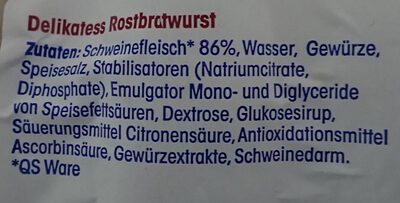Delikatess Rostbratwurst - ja! - 540 g
This product page is not complete. You can help to complete it by editing it and adding more data from the photos we have, or by taking more photos using the app for Android or iPhone/iPad. Thank you!
×
Barcode: 4388840063352 (EAN / EAN-13)
Quantity: 540 g
Packaging: Plastic
Brands: ja!
Categories: Meats and their products, Meats, Prepared meats, Sausages, German sausages, Thuringian sausages, de:Rostbratwurst
Labels, certifications, awards: No flavour enhancer
Traceability code: DE EV-1400 EG
Stores: REWE
Matching with your preferences
Environment
Packaging
Transportation
Report a problem
Data sources
Product added on by date-limite-app
Last edit of product page on by packbot.
Product page also edited by openfoodfacts-contributors, royalargus.
If the data is incomplete or incorrect, you can complete or correct it by editing this page.










